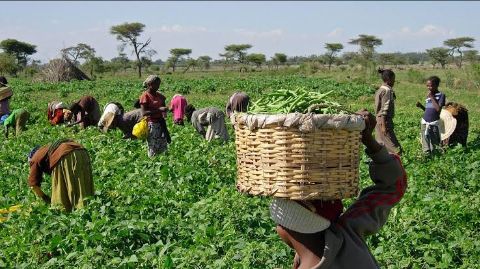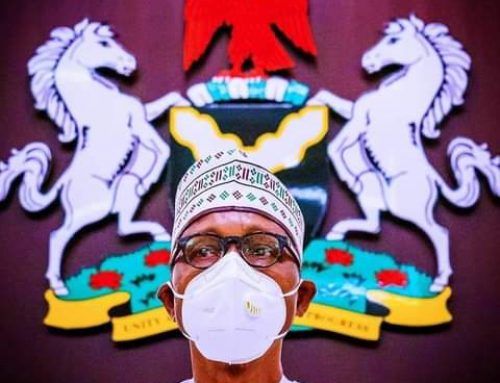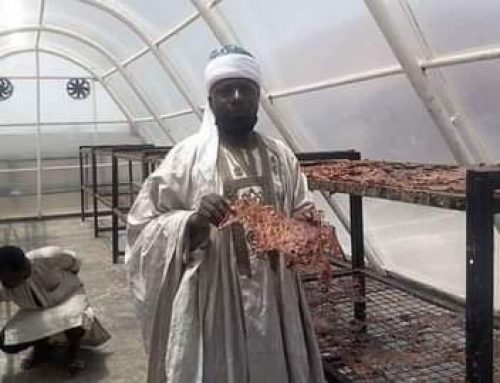Amidst the upsurge of the coronavirus pandemic, the Nigerian food system would be strained in the coming weeks and months, some agricultural experts have posited.
The experts, who spoke with PREMIUM TIMES, also suggested ways the country can navigate this period of uncertainty and ensure food security, especially in the light of the declining purchasing power of most Nigerians.
Lockdown
President Muhammadu Buhari on March 29 declared a total lockdown on the Federal Capital Territory-FCT, Lagos and Ogun States.
The lockdown was announced as a measure to curb the spread of the COVID-19 pandemic which is fast spreading around the world leaving deaths in its wake.
However, commercial establishments such as food processing, distribution and retail companies, petroleum distribution and retail entities, power generation, transmission and distribution companies and private security companies are exempted from the lockdown.
“Although these establishments are exempted, access will be restricted and monitored,” the president noted while addressing Nigerians.
Also, across states in Nigeria, farmworkers and agro business owners have been struggling to understand what the coronavirus outbreak and lockdown measure will mean for their safety and livelihoods as planting season sets in.
Ripples
Ayodeji Balogun, Chief Executive Officer, Affex commodity Exchange Limited, explains some of the challenges the lockdown and pandemic pose.
This was contained in Mr Balogun’s presentation slides during an online meeting, on the theme: Impact of COVID-19 on Nigeria’s food systems, organised by Affex commodity exchange on Friday.
Affex is Nigeria’s first private sector commodity exchange firm established in 2014 to transform commodity and securities exchanges in sub-Saharan Africa in support of capital market development.
According to him, the possible challenges to Nigeria’s food systems would include: price spikes, labour shortages, logistics challenges, shortage of fertilisers and other inputs and limited access to markets.
“Transport restrictions and quarantine measures are likely to impede farmers’ access to markets, curbing their productive capacities and hindering them from selling their produce,” he said.
Mr Balogun said shortages of labour could disrupt production and processing of food, notably for labour-intensive industries.
“Due to movement restrictions, farmers will have limited access to inputs and input providers will have a challenge reaching farmers in their locations,” he said.
Folarin Okelola, the spokesperson of National Agricultural Seeds Council, the government agency that regulates the seed industry in Nigeria, weighed in.
He said the council’s management is trying to liaise with the government to grant permits to agricultural workers in order to address some of the farmers’ needs this period in terms of seed supply, as farming season commences.
“Even to get to my office, the security men are saying I don’t have the permit,” he said. “We are planning to have a skype meeting on Tuesday with the director general to properly address some of these issues.”
“On our social media handles, we have been engaging farmers whose farms are not too far from their respective homes to do their skeletal work, so that they won’t be food shortages after the pandemic,” he said.
Other views
Emem Essien, chief operating officer, Crop2cash Limited, who spoke with PREMIUM TIMES said: “I have a farm of over 300 acres under personal management, because of this pandemic and the government response to it by locking down, I find it very difficult to navigate to the farm.”
Mr Essien said getting essential supplies such as seeds and inputs is very difficult. He said prices of such have skyrocketed “if someone eventually gains access to it”.
“Already, importers of farm inputs have it clear that prices are going up because of the rise in dollar compounded by the Covid-19 crisis. Farm inputs have gone up by 24 per cent. This will have an overall impact on cost of production thereby leading to increase in food prices.
“For farmers who will not be able to afford necessary inputs for their production, this will translate into lower yield. Lower yield means demand will be more than supply which will force prices up,” he said.
All these point to a looming food crisis “if we don’t manage the situation well,” Mr Essien said.
“Remember, if we don’t finance farmers now and ensure they grow, we will all be hungry post-COVID,” he added.
“Before the federal government declared the total lockdown in some of these states, Kaduna State where I’m operating had already clamped down a week before—absolute curfew,” said Celestine Ayok, Director, Spring Dairy Limited, said. “Most persons who are into egg production are lamenting as there is nobody to off-take their products.”
“In poultry, we have a serious crisis because most of our farmers that are into production have eggs the birds are laying. There is no market to off-take and there is nothing we can do,” Mr Ayok said.
He noted that the products, “if not sold on time or preserved under its required temperature might go bad.”
COVID-19 impact
According to the United Nations Food and Agricultural Organisation, currently, some 820 million people around the world are experiencing chronic hunger – not eating enough caloric energy to live normal lives.
The FAO says, of this, 113 million are coping with acute severe insecurity – hunger so severe that it poses an immediate threat to their lives or livelihoods and renders them reliant on external assistance to get by.
“These people can ill-afford any potential further disruptions to their livelihoods or access to food that COVID-19 might bring. As a result of the above, as of April and May we expect to see disruptions in the food supply chains,” it added.
It said “blockages to transport routes are particularly obstructive for fresh food supply chains and may also result in increased levels of food loss and waste. Fresh fish and aquatic products, which are highly perishable and therefore need to be sold, processed or stored in a relatively limited time are at particular risk.”
Also, shortages of labour could disrupt production and processing of food, notably for labour-intensive industries (e.g. crops or fishing), the FAO said.
Agric experts who spoke with PREMIUM TIMES said transport restrictions and quarantine measures now in place in many places impede farmers’ access to markets, curbing their productive capacities and hindering them from selling their produce.
Way forward
Meanwhile, the FAO, in a recent statement on its website, said to mitigate the impact of coronavirus pandemic on agriculture, countries must meet the immediate food needs of their vulnerable populations, boost their social protection programmes, keep food supply chains flowing and gain efficiencies aimed to reduce costs related to trade.
To effectively do these, the FAO urges countries to ensure that emergency food needs are met, adjust social protection programmes, scale up nutritional support, support management and prevention of under-nourishment and adjust school meal programmes so as to continue delivering school meals even when schools are shut.
“It remains a sad reality that the widening nature of the coronavirus pandemic holds great challenges for food production across the country,” Yusuf Ogunbiyi, Product Development Analyst at AFEX said.
He said pre-emptive approaches could help mitigate the risks of food crisis in the near future adding that the government should support food production through the provision of necessary agricultural inputs.
“A key concern is how the input could be distributed or loaned out to farmers while avoiding the risk of spreading the disease,” he said. “One solution could be the partnership with companies that have last mile interactions with the farmers. This will help organise the support and coordinate the implementation of the programme.”
Also, Razaq Fatai, policy lead for agriculture and inclusive growth at ONE Campaign, said for Nigeria to up its game towards ensuring food security, “governments need to secure food supply chains, by ensuring that farmers and other agribusiness players are not prevented from going to work due to lockdown.”
“We’re stuck with our produce,” Mr Ayok said. “The government should off-take them and distribute alongside the indomie and other relief materials they are sharing to citizens.”
“The federal government should patronise these farmers. We’re not saying they should give us money. No! Buy our product so as to enhance our cash flow for production,” Mr Ayok added.
Credit: Premium Times





Leave A Comment